Colder temperatures have arrived in the Tennessee Valley, and they're here to stay for at least another two weeks, forecasters say.
"The weather pattern has definitely changed to a much colder [one]," Jeremy Buckles, a meteorologist with the National Weather Service, said. "Overall, for the next week, we're going to be below normal on temperatures."
Across the region, highs will stay at or below 50 for the most part, and by this time next week highs will hang around the 40s. Lows will dip into the mid 20s over the weekend and warm up by a few degrees before taking another dip next week, Buckles said.
But even with some below-freezing lows, there isn't much of a chance for snow in store for the Chattanooga area. Higher elevations might have a slight chance to see some flurries on Friday, Buckles said.
Forecast
Thursday: 48/35Friday: 41/31Saturday: 46/26Sunday: 41/26Monday: 50/26Tuesday: 40/32Source: WRCBTV.com
"Over the weekend, there will be some [weather] systems moving through, but most of the moisture is staying north of Chattanooga," he said.
Overall, Tennessee Valley residents can expect to see plenty of cloudy days with breaks of sunshine over the weekend.
"Sunday and Monday will probably be the clearest days," Buckles said.
Higher elevations may have wind chill values below zero on some days, so hikers should be aware of that, he said.
The unusually colder temperatures are thanks to high-pressure systems over western states causing a dip in the jet stream over eastern states, allowing colder air from Canada to travel southward, Buckles said.
Paul Barys, chief meteorologist for WRCB-TV Channel 3, said air north of the jet stream is usually colder, while air to the south is warmer. Because the jet stream tends to bend north and south, when winter temperatures heat up in Alaska, eastern states usually get really cold, he said.
"Almost always," he said. "Not 100 percent of the time, but it's better than 85 percent."
Contact staff writer Rosana Hughes at rhughes@timesfreepress.com or 423-757-6327. Follow her on Twitter @HughesRosana.
